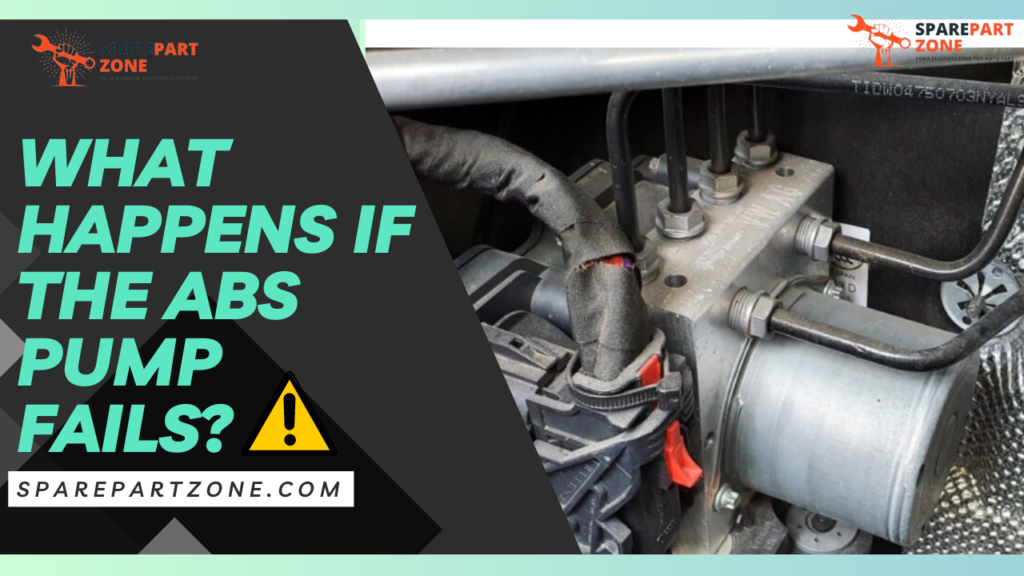
The ABS pump in a car is an important part of the Anti-lock Brake System (ABS).
The ABS is a safety feature. Basically, which helps prevent the wheels of a car from locking up during hard braking, & which can cause the car to skid and lose control. The ABS pump is responsible for controlling the pressure of the brake fluid in the brake lines to prevent the wheels from locking up.
When you apply the brakes in a car with ABS, the ABS pump activates and begins to pump the brake fluid at a high rate of speed. This rapid pumping action helps to prevent the wheels from locking up by maintaining consistent pressure in the brake lines. This allows the driver to maintain control of the car during hard braking and helps to reduce the stopping distance.
The ABS pump is typically located in the car’s engine compartment and is connected to the ABS control module. The control module receives input signals from sensors on each wheel that monitor the speed and rotation of the wheels. If the control module detects that a wheel is about to lock up, it sends a signal to the ABS pump to activate and control the pressure in the brake lines.
It’s important to maintain the ABS pump and the entire ABS system in your car to ensure that it functions properly. Regular maintenance and inspection can help to prevent problems with the ABS system and ensure that it works effectively in an emergency braking situation. If you notice any problems with the ABS system, such as a warning light on the dashboard or difficulty stopping the car during hard braking, it’s important to have the system checked by a qualified mechanic as soon as possible.
What causes ABS pump failure?
There are several factors that can cause ABS pump failure in a car. Some of them are mentioned below:
1. Electrical Problems: The ABS pump is powered by electricity and relies on a functioning electrical system to operate. If there are problems with the wiring or connections to the pump, it can cause the pump to fail. Additionally, problems with the battery or alternator can affect the performance of the ABS pump.
2. Contamination: The ABS pump is located in the engine compartment of the car and can be exposed to dirt, debris, and other contaminants. Over time, this can cause the pump to become clogged or damaged, leading to failure.
3. Wear and Tear: The ABS pump contains several moving parts that can become worn or damaged over time. For example, the motor that drives the pump can wear out or the bearings can become damaged, causing the pump to fail.
4. Corrosion: The Corrosion is common because ABS pump is made of metal components. Corrosion can cause the parts to become weakened or damaged, leading to failure.
5. Overheating: The ABS pump can become overheated if it is used excessively or if the car is driven in extreme weather conditions. Overheating can cause the pump to fail or reduce its effectiveness.
Regular maintenance and inspection of the ABS system can help to prevent ABS pump failure. It’s important to have the system checked by a qualified mechanic if you notice any problems with the brakes or the ABS warning light on the dashboard. Additionally, avoiding harsh driving conditions and maintaining a clean engine compartment can help to prevent contamination and wear and tear on the ABS pump.
What happens if ABS pump fails?
If the ABS pump in a car fails, it can lead to several problems with the braking system.
ABS pump failure causes problems like increased stopping; which means the car has a longer stopping distance & duration, which can be dangerous (especially in emergency braking situations where stopping distance is critical). Loss of control is another result of the failure; When the wheels lock up during hard braking, it can cause the car to skid or lose control. Without the ABS system working properly, the risk of losing control during hard braking increases.
It is important to have the ABS system checked by a qualified mechanic if you notice any problems with the brakes or the ABS warning light on the dashboard. Ignoring these warning signs can lead to further problems with the braking system and increase the risk of accidents. In some cases, replacing the ABS pump or other components of the ABS system may be necessary to ensure the safe and effective operation of the brakes.
Can I replace ABS pump?
Yes, the ABS pump in a car can be replaced if it fails or becomes damaged. If the pump fails, it can lead to problems with the braking system, such as increased stopping distance, loss of control, or brake fluid leaks.
Replacing the ABS pump typically involves removing the old pump and installing a new one. This can be a complex process that requires specialized tools and knowledge of the braking system. The replacement should take place by a qualified mechanic who is trained to work on the ABS system.
Before replacing the ABS pump, the mechanic will typically diagnose the problem to ensure that the pump is the cause of the issue. This may involve checking the ABS warning light on the dashboard, performing a brake test, or using a diagnostic tool to check for error codes.
Once it’s determined that the ABS pump needs to be replaced, the mechanic will remove the old pump and install a new one. The new pump will need to be calibrated and tested to ensure that it’s working properly. The mechanic may also need to bleed the brakes to remove any air bubbles from the system.
Overall, replacing the ABS pump in a car can be a complex process that requires specialized tools and knowledge of the braking system. It’s important to have the work done by a qualified mechanic to ensure that the brakes are safe and effective.

